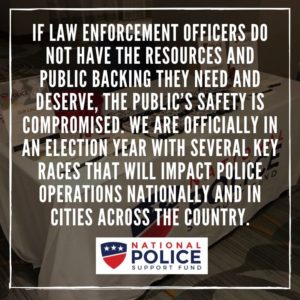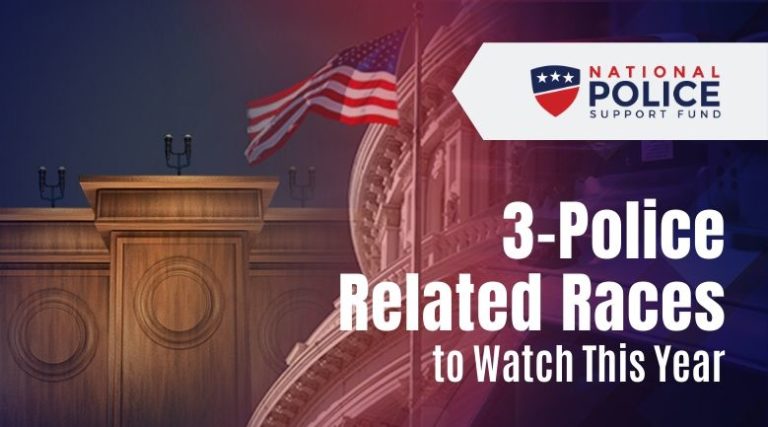As we’ve previously written, police can do their jobs most effectively when they have support from elected officials. If law enforcement officers do not have the resources and public backing they need and deserve, the public’s safety is compromised.
We are now officially in an election year, and there are several key races that will impact police operations and public support nationally and in cities across the country. Here are three races that the National Police Support Fund is watching this year:
Presidential Election
All eyes will be on the presidential election this year for many reasons, but the battle between President Trump and whomever the Democrats choose as a nominee will be especially important to the law enforcement community.
Since the first days of his campaign, President Trump has shown himself to be a true supporter of the police and the value they provide to the community. On the campaign trail, he continually advocates for the importance of “law and order,” which is refreshing to hear in today’s political climate.
The International Union of Police Associations has already pledged its support of the president’s re-election campaign. In a statement, organization president Sam Cabral said he finds President Trump “honest and refreshing.”
“He stands with America’s law enforcement officers and we will continue to stand with him,” Cabral said.
The Trump campaign welcomed the endorsement and took the opportunity to reinforce its commitment to police officers and the issues they face.
“Too often today, law enforcement officers are treated as scapegoats, when in fact their jobs are incredibly difficult, dangerous, and depend on life-or-death, split-second decision-making. This union endorsement of President Trump means a great deal, because not only does the president stand for working people, he also stands for law enforcement,” said Trump campaign manager Brad Pascale.
Hamilton County, Ohio Sheriff
Hamilton County, Ohio is home to Cincinnati and at the heart of a transition between support for Democrats and Republicans. The county voted for Hillary Clinton in 2016 but supported Republicans running for House and Senate.
Sheriff Jim Neil is a Democrat but has been criticized for appearing on stage at a rally with President Trump in 2016. He’s since apologized for the appearance but remains a vocal supporter of the president and his policies on illegal immigration.

These positions were enough to convince the county’s Democratic party to support Neil’s challenger, Chermaine McGuffey.
“For people like me who represent the future of the party, where the party is supposed to be going,” said Cincinnati City Councilwoman Tamaya Dennard, “an endorsement of Jim Neil says to me you don’t care about people who are black. You don’t care about people who are LGBTQ. You don’t care about people who have grown up in poverty.”
Neil said law enforcement officers would not support McGuffey, whom Neil fired in 2017 for creating a hostile work environment. He said that having him as the Democrat on the ballot is the only way to keep the position in the party’s control.
“Law enforcement will not support McGuffey,” Neil said. “If I am not your candidate, it is highly likely we will lose this office.”
If elected, McGuffey plans to bring measures from other cities to Cincinnati, including reduced sentences, more rights for incarcerated people, and a push for de-escalation in aggressive encounters. All of these actions will make it more difficult for the city’s police officers to keep residents safe in dangerous situations and empower felons to over law enforcement.
The primary between Neil and McGuffey will be held on March 17. The winner will face Republican Bruce Hoffbauer in November. Given Ohio’s status as a swing state, this race could set the tone for other sheriff elections across the country.
Philadelphia District Attorney
Philadelphia’s district attorney is not on the ballot this November, but current DA Larry Krasner has been so destructive to police ideals and caused so much of a stir that this one is worth paying attention to now;
Krasner is known for taking positions against the city’s police force and pushing for reforms that would make it more difficult for the police to do their job. He has sued the police more than 75 times during the course of his career and frequently sides with anti-police movements.
He’s also overhauled the police force’s sentencing procedures and decriminalized marijuana possession. Most recently, he publicly sided with former Philadelphia Eagles player Malcolm Jenkins, who is calling for a “radical transformation in how we police.”
Jenkins has a longstanding feud with Philadelphia FOP John McNesby, and now Krasner has publicly sided with Jenkins. That action drew criticism from William McSwain, U.S. Attorney for the Eastern District of Pennsylvania and Philadelphia’s highest-ranking federal prosecutor.
McSwain, a Trump administration appointee, said Krasner’s actions as district attorney demonstrate a “stunning disrespect for law enforcement” and that Krasner’s office has a history of going easy on violent criminals.
Krasner’s term is not up until 2022, but he is expected to decide by the end of the year whether he’ll seek re-election. He has already garnered significant national attention for his agenda, so his opponent will need support from far outside Philadelphia to help defeat him.
Are elected officials helping or hurting police? Let’s dive into the complicated relationship between police, politicians, and judges to explore how each group works with — and sometimes against — one another. Read more here.








